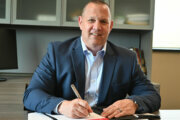ELAINE KURTENBACH
AP Business Writer
TOKYO (AP) — Japan’s economy shrank more sharply in the second quarter than first estimated and the latest indicators suggest only a modest bounce back since then.
The world’s third-largest economy contracted at an annualized rate of 7.1 percent in the April-June quarter, according to updated government figures Monday. The initial estimate released earlier this month said the economy contracted 6.8 percent. Business investment fell more than twice as much as first estimated.
The economy’s contraction was expected after Japan increased its sales tax from 5 percent to 8 percent on April 1.
So far, data for the current July-September quarter suggest any rebound in growth is likely to be modest and slow in materializing.
A government survey of “economy watchers” released Monday showed confidence in the economy’s prospects deteriorated in August.
Business activity surged early in the year, with the economy growing 6 percent in January-March, as consumers and businesses stepped up purchases to avoid paying more tax.
Prime Minister Shinzo Abe has championed an aggressive stimulus program aimed at ending chronic deflation that has discouraged corporate investment and dragged on growth. A sustainable recovery will require strong corporate and private spending, since exports and public spending have so far done little to lift growth.
Abe will be watching data from the current quarter as he decides later in the year whether to go ahead with a further 2 point increase in the sales tax to 10 percent in 2015.
Surveys show the public opposes a further tax increase, though increases are needed to counter ballooning public debt, which now is more than twice the size of the economy.
The revised data Monday show business investment fell more than twice as much as estimated before, or 5.1 percent, while private residential spending sank 10.4 percent in annual terms.
“Theoretically, there should be no impact from the consumption tax increase on corporate spending or long-term corporate planning, but a large number of Japanese corporations seemed to see a large impact from the hike on final demand,” said Junko Nishioka, an economist at RBS Japan Securities in Tokyo.
“We are not that pessimistic for the future picture of the Japanese economy,” Nishioka said, forecasting a “V-shaped recovery,” supported by stronger wage growth.
Conditions remained weak in July. Real incomes fell 6.2 percent from a year earlier and household spending dropped.
The survey of economy watches, a grassroots assortment of service industry workers and others thought to have a good real-time sense of business activity, was at 47.4 in August, down from 51.3 in July and the first drop in five months.
“Industrial production was still 2 percent below the second quarter average in July, and we have yet to see a turnaround in capital spending,” Marcel Thieliant of Capital Economics said in a commentary.
___
You can follow Elaine Kurtenbach on Twitter: http://www.twitter.com/ekurtenbach
Copyright 2014 The Associated Press. All rights reserved. This material may not be published, broadcast, rewritten or redistributed.







